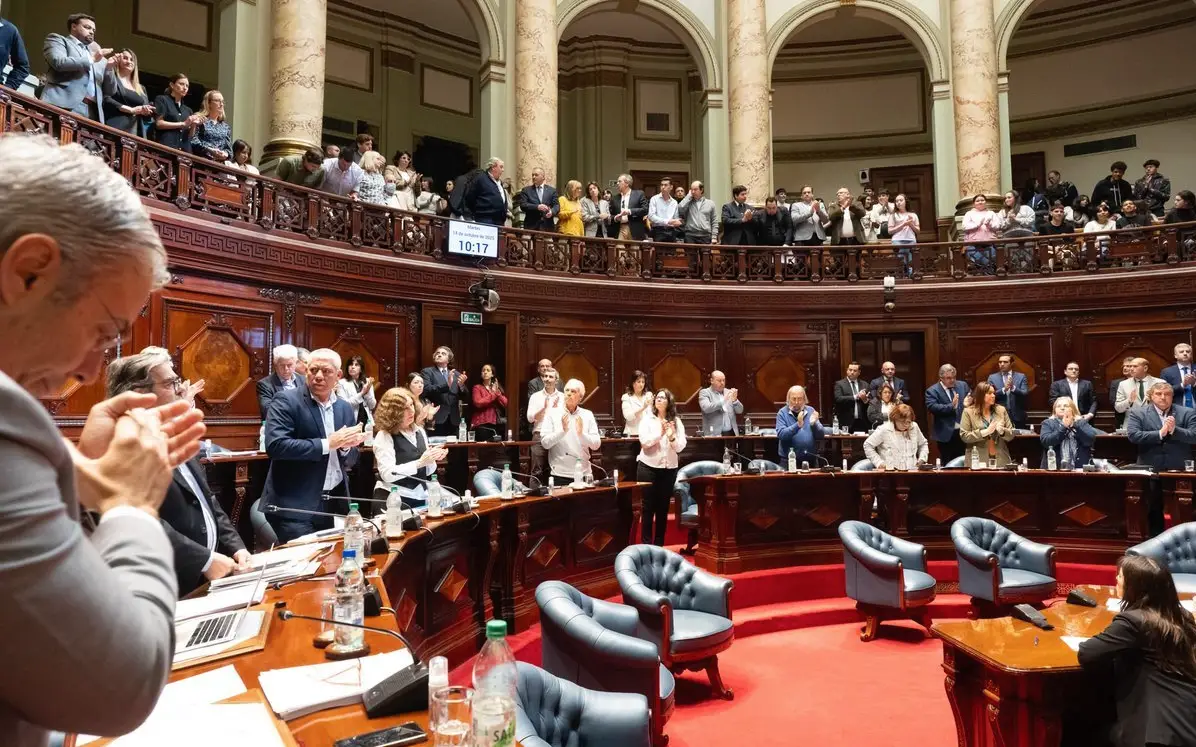According to the “welfare state” typology, Uruguay is an exceptional country. While many of these policies were consolidated during the progressive era, they are not exclusive to it. In fact, since the early 20th century—when the prevailing political model followed the Batllista movement—the state was already characterized by a liberal and humanist tradition. In modern times, Uruguay has sought to remain at the forefront of social justice: the regulation and control of cannabis, the decriminalization of abortion, and the legalization of same-sex marriage are just a few examples of the many accomplishments of a genuine liberal democracy. Now, following the legalization of euthanasia, the country adds a new milestone in the field of rights, granting its citizens guarantees even in the most critical moments of their lives.
Parliament is, indeed, the house of democracy. That grand chamber hosts the nation’s most relevant political debates. Thus, on October 15, after a long Senate session, one of the world’s most debated and progressive laws was passed: the “dignified death” law, which legalizes euthanasia in cases of incurable illness and extreme suffering. With this decision, the South American nation becomes the eleventh country worldwide—and the seventh through parliamentary approval—to regulate the practice. Unlike Colombia and Ecuador, where euthanasia has been decriminalized through judicial rulings, Uruguay sets a precedent in Latin America by enshrining it in a clear, formal, and rights-based law.
Inspired by models such as those of Belgium and the Netherlands, the new law provides all necessary guarantees for the correct implementation of active euthanasia. It includes an honorary commission tasked with annual case reviews, the support of a Medical Board, and even revocation mechanisms—both for patients who choose to withdraw from the procedure and for professionals who refuse to carry it out. As argued by legislators such as Daniel Borbonet, a neonatologist and member of the ruling party, the law imposes no obligations but instead creates options where none existed before.
The enactment of this law represents the culmination of more than five years of intense deliberation, as well as political, ethical, and even moral questioning. Among the most prominent criticisms are religious justifications which, in a secular nation since 1917, should have little resonance in public debate. Nevertheless, some continue to reject the bill on bioethical grounds, claiming it undermines the sanctity of human life. In contrast, its defenders highlight the law’s “rights-based” nature, granting each individual the autonomy to decide over their body when mere existence has become an ordeal.
Party discipline? No, freedom and coexistence
The debate spanned two government terms, a change in political orientation, and several parliamentary reorganizations, yet it never lost its tone of respect and dialogue. In a country accustomed to resolving its differences with institutional calm, euthanasia demanded patience but never descended into stridency.
Out of 31 possible votes, 20 were in favor. In addition to the 17 votes from the left-wing coalition Frente Amplio, which holds the presidency, the remaining 3 came from opposition parties—2 from the Colorado Party and, surprisingly, 1 from the National Party. No political faction voted under party discipline; each legislator acted individually. This freedom of action allowed figures such as Senator Graciela Bianchi, from the National Party, to distance herself from her peers and support the bill.
Ope Pasquet, regarded as the “father” of the legislation, defended it by stating that “there is no dignity without freedom.” The iconic legislator, recently retired, returned to parliamentary life to deliver his final and decisive contribution. But the law is not solely the work of benevolent lawmakers—it is also the triumph of an organized and informed civil society. Sovereignty resides in the people, and every progressive public policy requires mobilization. Without the efforts of groups such as Empatía Uruguay, as well as the powerful testimonies of patients and families who endured painful journeys, the bill might have remained forgotten in a drawer somewhere.
Dignified death? Yes, a free, serene, and above all, dignified death
In conclusion, the debate surrounding the law is far from over. As with many groundbreaking initiatives, opposing voices will continue to gain strength over time. For some, the phrase “dignified death” itself is disturbing. They ask, what distinguishes a dignified death from an undignified one? The answer likely lies in the very principle that gives meaning to life: freedom—and above all, the freedom to choose.
With this legislation, Uruguay does not celebrate death, much less encourage it. What it offers, to people under specific circumstances, is the guarantee that they may choose regarding their own life. Dying with dignity depends not solely on medical conditions, nor on religious or cultural backgrounds, but on ensuring autonomy in decision-making. It is about enshrining a principle inherent to individual liberty.
Paradoxically, the day after the law’s enactment, the President of the Republic, Yamandú Orsi, was at the Vatican awaiting an audience with the Supreme Pontiff, Leo XIV. When asked about the law, he remarked that euthanasia is a matter that brings philosophy and religion into dialogue, but not partisan identities. Though his answer did not convince everyone, it was, at that moment, the most elegant possible. In the end, the euthanasia law is now a reality in Uruguay—offering the region a roadmap as well: dignity is not legislated through dogma, but through dialogue and, above all, through freedom.













